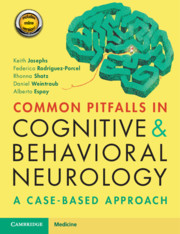Book contents
- Common Pitfalls in Cognitive and Behavioral Neurology
- Common Pitfalls in Cognitive and Behavioral Neurology
- Copyright page
- Dedication
- Contents
- Diseases Discussed in the Book
- Preface
- Acknowledgements
- Abbreviations
- Part 1 Missing the Diagnosis Altogether
- Part 2 Misidentifying the Impaired Cognitive Domain
- Part 3 Missing Important Clues in the History
- Part 4 Failure of Pattern Recognition
- Part 5 Difficult-to-Characterize Cognitive/Behavioral Disorders
- Part 6 Clinical Findings That Are Subtle
- Case 26 Something Does Not Look Right
- Case 27 Moving without Thinking
- Case 28 A Pause in the Clause
- Case 29 Seeing beyond Alzheimer Disease
- Case 30 “That Is Not How I Feel”
- Part 7 Misinterpreting Test Results
- Part 8 Attributing Findings to a Known or Suspected Disorder
- Part 9 Missing Radiographic Clues
- Part 10 Management Misadventures
- Index
- Plate Section (PDF Only)
- References
Case 29 - Seeing beyond Alzheimer Disease
from Part 6 - Clinical Findings That Are Subtle
Published online by Cambridge University Press: 03 November 2020
- Common Pitfalls in Cognitive and Behavioral Neurology
- Common Pitfalls in Cognitive and Behavioral Neurology
- Copyright page
- Dedication
- Contents
- Diseases Discussed in the Book
- Preface
- Acknowledgements
- Abbreviations
- Part 1 Missing the Diagnosis Altogether
- Part 2 Misidentifying the Impaired Cognitive Domain
- Part 3 Missing Important Clues in the History
- Part 4 Failure of Pattern Recognition
- Part 5 Difficult-to-Characterize Cognitive/Behavioral Disorders
- Part 6 Clinical Findings That Are Subtle
- Case 26 Something Does Not Look Right
- Case 27 Moving without Thinking
- Case 28 A Pause in the Clause
- Case 29 Seeing beyond Alzheimer Disease
- Case 30 “That Is Not How I Feel”
- Part 7 Misinterpreting Test Results
- Part 8 Attributing Findings to a Known or Suspected Disorder
- Part 9 Missing Radiographic Clues
- Part 10 Management Misadventures
- Index
- Plate Section (PDF Only)
- References
Summary
This 69-year-old right-handed woman presented with 3-year history of progressive memory problems. Her husband described her initial difficulty was recalling recent events along with repeating stories. Within a year, she struggled with reading and with recognizing people, which she attributed to a change in vision. An ophthalmologic evaluation revealed bilateral cataracts, which were surgically corrected. However, her visual abilities continued to decline after surgery. She started having difficulties identifying objects and judging distances, which led her to stop driving. She denied any issues with her memory and attributed all of her problems to her vision, although she could not elaborate further. Her exam was remarkable for a circumlocutory discourse. Her Montreal Cognitive Assessment (MoCA) score was 12/30 due to impairments in trail making, cube copying, clock drawing, naming, serial sevens, phonemic fluency, delayed recall (she could not recall any words freely and recognized only one when multiple choices were given), and orientation to month and date.
- Type
- Chapter
- Information
- Common Pitfalls in Cognitive and Behavioral NeurologyA Case-Based Approach, pp. 93 - 95Publisher: Cambridge University PressPrint publication year: 2020



